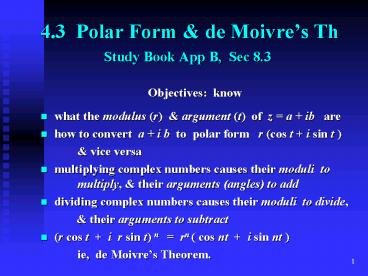4'3 Polar Form - PowerPoint PPT Presentation
1 / 6
Title:
4'3 Polar Form
Description:
what the modulus (r) & argument (t) of z = a ib are ... And cubing in polar form gives ( cos i sin ) 3 = cos 3 i sin 3. 5 ... – PowerPoint PPT presentation
Number of Views:31
Avg rating:3.0/5.0
Title: 4'3 Polar Form
1
4.3 Polar Form de Moivres Th Study Book
App B, Sec 8.3
- Objectives know
- what the modulus (r) argument (t) of z a
ib are - how to convert a i b to polar form r (cos
t i sin t ) - vice versa
- multiplying complex numbers causes their moduli
to multiply, their arguments (angles) to add - dividing complex numbers causes their moduli to
divide, - their arguments to subtract
- (r cos t i r sin t) n rn ( cos nt i
sin nt ) - ie, de Moivres Theorem.
2
- To change z a ib, to polar form,
- plot z and find its polar coordinates
- distance r , ie modulus z a
ib v a 2 b 2 . - and angle t, the argument.
- a ib
-
r - t
- Then a r cos t and b r sin t .
- Hence a ib r cos t i r
sin t - r ( cos t i sin
t ) - the polar form of a ib.
3
- To convert from standard form a ib to polar
form - First plot aib to see its quadrant,
- then use Pythagoras trig to get r t.
- Example - 1 - sqrt(3) i
-1 - Pythagoras gives r sqrt(1 3) 2
- r
- Angle is (180 60) degrees 4pi/3
- Polar form is 2 ( cos 4pi/3 i sin 4pi/3 )
-1 - sqrt3 i - To convert from polar form to form a ib,
- find a and b using a r cos t , b r sin t.
- Example 3 (cos 3pi/4 i sin 3pi/4)
- 3 ( -1/sqrt2 i 1/ sqrt 2)
- - 3 / sqrt 2 i 3/
sqrt 2
4
- Multiplying 2 numbers in polar form gives
- R (cosA i sinA) S(cos B i sin B) RS
cos (AB) i sin(AB) - ie their moduli multiply, but their arguments
add! - Dividing 2 numbers in polar form gives
- R (cosA i sinA) / S (cos B i sin B)
R/S cos (A-B) i sin(A-B) - ie their moduli divide, but their arguments
subtract! - Hence squaring in polar form gives
- R( cos ? i sin? ) 2 R2 cos 2?
i sin 2? - And cubing in polar form gives
- ( cos ? i sin? ) 3 cos 3? i sin 3?
5
- Then de Moivres Theorem (Th 8.5, p 449)
follows, - ( cos ? i sin? ) n cos n? i sin n?
- True not only for positive integers n,
- but also for n negative or rational.
- Example (cos pi/6 sin pi/6 )12 cos
2pi sin 2pi - 1 0 i
1 - Appendix B, Ex 3 4 (p 448 -9) use this rule.
- But doing them in Euler Form is easier.
- So master Sec 4.4 first, Euler Form, then come
back to these. - Nth roots (pp 450 - 2) are also easier done in
Euler form.
6
Homework
- Appendix B, p 438, Sec 8.3
- Master a few of Q 1 - 25
- Do more of these once you have mastered Section
4.4, converting z to Euler Form. - Write full solutions to
- Q 1 - 4, 5, 7, 9, 11, 37, 43.































